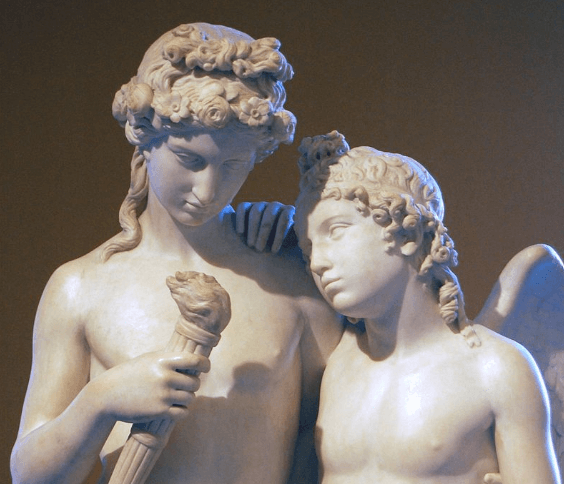The Myth of Hymen, the Greek God of Marriage

The myth of Hymen is closely related to marriage. It isn’t clear if the word “hymen”, which corresponds to the membrane present in the vaginal orifice of virgin women, comes from the name of this god or if the name of the god was created based on that word.
As is common in Greek mythology, there are several versions of the myth of Hymen. One of them says that this “lesser god“ was the son of Dionysus, god of wine and fertility, and Aphrodite, goddess of sex and beauty. Another version states that he was the son of Apollo, god of beauty and music, and of one of the muses, probably Calliope, muse of epic poetry and eloquence.
There’s also a third version about the origin of the myth of Hymen. In this one, our character isn’t a god, at least in principle, but rather a mortal, son of Magnes. However, all three versions do concur that he was a young man of extraordinary beauty. However, this latter says that he was so good-looking that Apollo fell in love with him and never left the house where the boy lived.

The myth of Hymen
The central legend of the Hymenian myth starts with the idea that Hymen was a mortal. In fact, he was a young man of extraordinary beauty but of very low lineage. He had the misfortune to fall in love with the daughter of one of the richest men in Athens. This was an impossible love, as his humble background ruled out any possibility of marrying the girl in question.
His infatuation led him to follow the girl everywhere, without her noticing. Wherever she went, there he was, admiring her. As he was always close by, he could also hear her conversations. One day, he learned that she, along with other women, was going to make a pilgrimage to Eleusis, to offer a sacrifice to Demeter, the Greek goddess of agriculture.
The legend tells us that the young man saw that this was a wonderful opportunity to approach the young woman. He decided to disguise himself as a woman and to join the procession, as men weren’t accepted in these types of processions. Such was Hymen’s beauty that he was easily mistaken for a woman and was able to join the pilgrimage without any problems.
A great opportunity
To make the pilgrimage, the participants needed to go by ship. However, soon after the ship sailed, they were intercepted by pirates. They took possession of the boat and captured all the women on it. They forced the ship to set down its anchor at a deserted place along the coast. Hymen was attentive, though, and when the pirates were resting, he seized the opportunity.
The young man revealed his identity to the girls who accompanied him and told them his plan. Together, they attacked the pirates, and, eventually, managed to kill them all. By then, the woman he loved had also fallen in love with him.
Hymen then guided the ship to a safe place and left the girls there. He then went to Athens and told everyone what had happened. He announced that he would only give all the women back if the woman he loved was granted to him in marriage in return. The Athenians accepted his request willingly and, as agreed, began preparations for the marriage.

A myth that became a tradition
The myth of Hymen says that the wedding was prepared meticulously. Both he and the woman were deeply in love by then and all Athenians celebrated this fact. On the day of the wedding, once the ceremony was over, Hymen suddenly fell to the ground, dead.
Immediately, both the dead man and the woman began to cry out with heartfelt lamentations. Neither of them wanted to accept their fate and prayed to the gods not to take away their happiness. One of the wedding guests was Asclepius, god of medicine and healing. Moved by the couple’s love, he decided to intervene and brought Hymen back to life.
Ever since that moment, he was given the task of attending every wedding in Athens. If he didn’t, it was considered a bad omen for the betrothed couple. Thus, if he couldn’t be present at a wedding, all the Greeks would shout “Hymen! Hymen!” It was their way of inviting him to the proceedings and bringing good luck to the married couple.
We hope you’ve enjoyed this fascinating story that gives us hope in the face of what might seem an impossible love!
All cited sources were thoroughly reviewed by our team to ensure their quality, reliability, currency, and validity. The bibliography of this article was considered reliable and of academic or scientific accuracy.
Valbuena, A. I. F. (1999). El mito del himeneo celeste en la ópera romántica italiana. In Amor y Erotismo en la Literatura: Congreso Internacional Amor y Erotismo en la Literatura (pp. 313-322). Caja Duero.
This text is provided for informational purposes only and does not replace consultation with a professional. If in doubt, consult your specialist.








